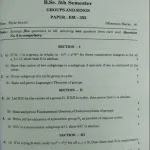D Pharmacy 2nd Year Question Paper PDF 2023 is an essential tool for students studying pharmacy. It helps them to prepare for exams by providing a range of questions and answers for each subject covered in the curriculum. The question papers serve as a guide for students to understand the exam pattern and the types of questions they may encounter in the final exam.
This article covers various subjects taught in the second year of a Diploma in Pharmacy (D Pharmacy) course. Each subject will have a list of questions followed by their answers, which will assist students in their preparation. The questions will cover all aspects of the subject, from theoretical concepts to practical applications.
Pharmacology
Question: What is pharmacology?
Answer: Pharmacology is the study of drugs, their effects, mechanisms of action, and therapeutic uses.
Question: Define pharmacokinetics.
Answer: Pharmacokinetics is the study of the absorption, distribution, metabolism, and excretion (ADME) of drugs in the body.
Question: What is the difference between pharmacodynamics and pharmacokinetics?
Answer: Pharmacodynamics deals with the effects of drugs on the body, while pharmacokinetics focuses on the body’s effect on drugs.
Question: Name the routes of drug administration.
Answer: Oral, intravenous, intramuscular, subcutaneous, topical, and inhalation are common drug administration routes.
Question: What are the different phases of clinical trials?
Answer: Clinical trials consist of Phase I (safety), Phase II (efficacy), Phase III (confirmation), and Phase IV (post-marketing surveillance).
Question: Explain the term “therapeutic index.”
Answer: The therapeutic index is the ratio between the toxic dose and the effective dose of a drug, indicating its safety margin.
Question: What is drug resistance?
Answer: Drug resistance occurs when microorganisms or cancer cells become less responsive to a drug, requiring higher doses or alternative treatments.
Question: Define drug interaction.
Answer: Drug interaction refers to the modification of the effect of one drug by another when taken together.
Question: What are antipyretics?
Answer: Antipyretics are drugs used to reduce fever, such as acetaminophen and ibuprofen.
Question: Describe the role of the liver in drug metabolism.
Answer: The liver is responsible for metabolizing drugs, converting them into water-soluble compounds for excretion.
Question: What are the common adverse drug reactions (ADRs)?
Answer: Common ADRs include nausea, vomiting, dizziness, allergic reactions, and organ toxicity.
Question: Explain the concept of bioavailability.
Answer: Bioavailability refers to the fraction of an administered drug that reaches the systemic circulation in an active form.
Question: What are the factors affecting drug absorption?
Answer: Factors include drug formulation, route of administration, blood flow, and the presence of food in the stomach.
Question: Define the term “half-life” of a drug.
Answer: Half-life is the time it takes for the concentration of a drug in the blood to reduce by half.
Question: What is the significance of the blood-brain barrier?
Answer: The blood-brain barrier prevents certain drugs from crossing into the brain, protecting it from harmful substances.
Question: Explain the concept of a loading dose.
Answer: A loading dose is an initial higher dose of a drug given to quickly achieve therapeutic levels in the body.
Question: What are opiate drugs?
Answer: Opiate drugs, derived from opium, are used for pain relief and can cause addiction. Examples include morphine and codeine.
Question: Define enzyme inhibition.
Answer: Enzyme inhibition occurs when a substance reduces the activity of an enzyme, affecting the metabolism of drugs.
Question: What is the role of pharmacogenetics in drug therapy?
Answer: Pharmacogenetics studies how genetic variations influence an individual’s response to drugs, helping to personalize therapy.
Question: What are the side effects of antihistamines?
Answer: Common side effects include drowsiness, dry mouth, blurred vision, and urinary retention.
Pharmaceutical Chemistry
Question: What is pharmaceutical chemistry?
Answer: Pharmaceutical chemistry involves the study of the chemical properties, synthesis, and formulation of drugs.
Question: Define the term “active pharmaceutical ingredient” (API).
Answer: The API is the biologically active component of a drug that produces the desired therapeutic effect.
Question: What are excipients?
Answer: Excipients are inactive substances used in drug formulations to aid in drug delivery, stability, and absorption.
Question: Explain the role of pH in drug formulation.
Answer: The pH of a drug formulation affects its stability, solubility, and absorption in the body.
Question: What is the difference between a generic and a brand drug?
Answer: A generic drug contains the same active ingredients as the brand drug but is typically sold at a lower price.
Question: Define the term “stereochemistry.”
Answer: Stereochemistry is the study of the spatial arrangement of atoms in molecules and how this affects their function.
Question: What is the purpose of quality control in pharmaceutical chemistry?
Answer: Quality control ensures that drugs meet specific standards of strength, purity, and effectiveness before reaching consumers.
Question: What is a drug molecule’s solubility?
Answer: Solubility refers to the ability of a drug to dissolve in a solvent, such as water, for effective absorption.
Question: What are the different types of drug formulations?
Answer: Drug formulations include tablets, capsules, syrups, injections, and topical applications.
Question: Explain the concept of a prodrug.
Answer: A prodrug is an inactive compound that is metabolized in the body to release the active drug.
Question: What are the types of chemical bonds in drug molecules?
Answer: Drug molecules contain covalent, ionic, hydrogen, and van der Waals bonds, which determine their stability and interactions.
Question: Describe the process of drug synthesis.
Answer: Drug synthesis involves chemical reactions to create active pharmaceutical ingredients from raw materials.
Question: What is a buffer solution, and why is it important in drug formulation?
Answer: A buffer solution maintains a stable pH, ensuring the stability and effectiveness of the drug.
Question: What is the role of antioxidants in drug formulations?
Answer: Antioxidants are used to prevent oxidation, preserving the drug’s potency and stability.
Question: Explain the significance of particle size in drug delivery.
Answer: Smaller particles increase the surface area, improving the dissolution rate and bioavailability of drugs.
Question: What is the significance of stability testing in pharmaceuticals?
Answer: Stability testing ensures that drugs retain their efficacy and safety over time under various storage conditions.
Question: What are the common methods for drug analysis?
Answer: Methods include chromatography, spectroscopy, titration, and mass spectrometry.
Question: Describe the role of dissolution testing.
Answer: Dissolution testing measures the rate at which a drug dissolves in a specific solvent, indicating its bioavailability.
Question: What is the concept of ‘polymorphism’ in pharmaceutical chemistry?
Answer: Polymorphism refers to the ability of a compound to exist in different crystal forms, affecting its solubility and bioavailability.
Question: What are the advantages of tablet dosage forms?
Answer: Tablets are convenient, stable, and easy to dose, making them a popular drug formulation.
Question: Explain the process of drug labeling.
Answer: Drug labeling includes information about the drug’s composition, dosage, usage instructions, and side effects.
Pharmaceutical Jurisprudence
Question: What is pharmaceutical jurisprudence?
Answer: Pharmaceutical jurisprudence is the study of laws and regulations governing the practice of pharmacy.
Question: What is the role of a pharmacist in the healthcare system?
Answer: Pharmacists ensure the safe and effective use of medications, offering guidance on dosage and potential interactions.
Question: Define the term ‘prescription’.
Answer: A prescription is a written order from a licensed healthcare provider for the dispensing of a specific medication.
Question: What are the Drug and Cosmetics Act, 1940?
Answer: The Drug and Cosmetics Act, 1940 regulates the manufacture, sale, and distribution of drugs and cosmetics in India.
Question: What is the role of the Pharmacy Council of India (PCI)?
Answer: The PCI oversees the regulation of pharmacy education and practice in India, ensuring high standards.
Question: What is the significance of the Narcotic Drugs and Psychotropic Substances Act, 1985?
Answer: This act controls and regulates the production, manufacture, and distribution of narcotics and psychotropic substances to prevent misuse.
Question: Define the term ‘Schedule H drugs’.
Answer: Schedule H drugs are those that require a prescription for sale, as they may have serious side effects if misused.
Question: What are the responsibilities of a pharmacist regarding drug labeling?
Answer: Pharmacists ensure that drug labels are accurate, providing necessary information such as dosage, ingredients, and expiry date.
Question: What is the significance of the Pharmacy Act, 1948?
Answer: The Pharmacy Act, 1948 governs the registration of pharmacists and the practice of pharmacy in India.
Question: What are the requirements for selling over-the-counter (OTC) drugs?
Answer: OTC drugs can be sold without a prescription, but they must meet safety and efficacy standards established by regulatory authorities.
Question: What is the role of a drug inspector?
Answer: Drug inspectors monitor the quality and safety of drugs in the market, ensuring compliance with regulations.
Question: What are the provisions of the Drugs and Magic Remedies Act, 1954?
Answer: This act prohibits the advertising of drugs that claim to cure certain diseases, such as cancer, diabetes, and sexual disorders.
Question: What is the meaning of ‘ethical drugs’?
Answer: Ethical drugs are those that are sold only on prescription and are used for the treatment of specific medical conditions.
Question: What is the significance of Good Manufacturing Practices (GMP)?
Answer: GMP ensures that drugs are consistently produced and controlled according to quality standards.
Question: What are the penalties for violating drug laws?
Answer: Penalties for violating drug laws include fines, imprisonment, or both, depending on the severity of the offense.
Question: What is the role of the Central Drugs Standard Control Organization (CDSCO)?
Answer: CDSCO is the national regulatory authority responsible for the approval and regulation of drugs and medical devices in India.
Question: What are the requirements for drug storage?
Answer: Drugs must be stored in a cool, dry place, away from light and moisture, and in accordance with manufacturer instructions.
Question: What is a Schedule X drug?
Answer: Schedule X drugs are narcotics and psychotropic substances that require special handling and licensing for distribution.
Question: What is the significance of drug recalls?
Answer: Drug recalls occur when a drug is found to be unsafe or ineffective, and it is removed from the market to protect public health.
Question: What is the function of a drug regulatory authority?
Answer: Drug regulatory authorities ensure the safety, efficacy, and quality of drugs, regulating their manufacture, sale, and distribution.
Question: What are the ethical guidelines for pharmaceutical marketing?
Answer: Ethical marketing ensures that pharmaceutical companies provide accurate, balanced information about their products and avoid misleading claims.
This collection of questions and answers provides a comprehensive overview of the key concepts in each subject of the D Pharmacy second-year curriculum. Students can use these materials to effectively prepare for their exams and gain a better understanding of the topics covered in their coursework.
Latest Posts
- Step-by-step guide to download and apply for jee mains admit card 202
- Comprehensive 2025 government holidays and recruitment details for job seekers
- JEE Mains Admit Card 2025: Your Step-by-Step Guide to Downloading the Hall Ticket
- Everything You Need to Know About 2025 Government Holidays Recruitment
- Comprehensive Guide to rrb d group recruitment 2025 – Eligibility, Vacancies, and Application
- Detailed guide to nps trust recruitment 2025 vacancies, eligibility and apply process
- Comprehensive guide to hpcl recruitment 2025 notification, vacancies, and application process
- ignou bed admission 2025 complete recruitment guide with eligibility and process
- Comprehensive Guide to Indian Army Agniveer Recruitment 2025 Notification and Jobs
- Everything You Must Know About CBSE Board Exams 2025 Changes & New Rules






